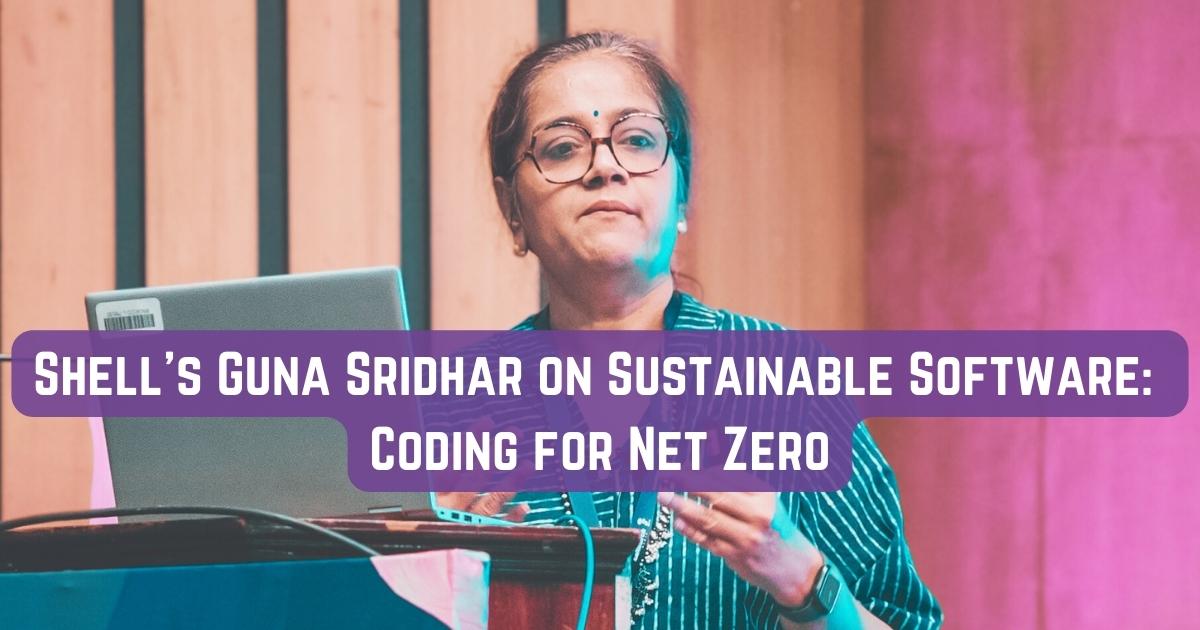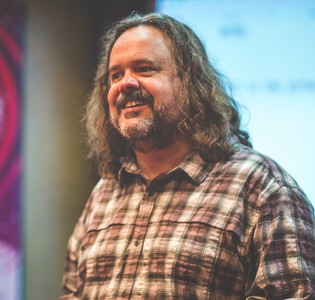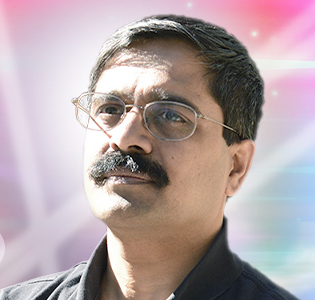
“Once again Saltmarch has knocked it out of the park with interesting speakers, engaging content and challenging ideas. No jetlag fog at all, which counts for how interesting the whole thing was."
Cybersecurity Lead, PwC

As digitalization accelerates in today's world, sustainability conversations are no longer confined to traditional sectors like manufacturing or agriculture. In fact, a McKinsey report suggests that digitalization could pump up global GDP by a staggering $2.2 trillion by 2025. Meanwhile, the tech sector alone is responsible for a not-so-insignificant 4% of global greenhouse gas emissions, as per a Shift Project study. Enter Guna Sridhar from Shell, who recently flipped the script, putting net zero software at the forefront of this discourse during a cutting-edge talk at Great International Developer Summit.
Sridhar, boasting a hefty 30-year background in IT, has spent the last six years watching Shell morph from a classic oil and gas behemoth to a cutting-edge, eco-conscious energy player. This isn't just a Shell story; BP is also on a similar trajectory, committing to net zero by 2050. According to the International Energy Agency, the world needs to cut CO2 emissions by 45% by 2030 to hit the 2050 net zero target. This transformation is part of a universal urgency to reach net zero emissions by 2050, a goal that goes beyond Shell’s corporate aspirations. Sridhar's talk articulated how the intertwined journeys of energy change and digital revolution are vital cogs in the machinery of environmental progress, serving as a blueprint for cross-sectoral digital strategies aimed at environmental gains.
Shell's commitment to sustainability is evident; their 2022 reports indicate a 30% reduction in emissions, aligning with the Paris Agreement's ambitious climate goals. Yet, the saga of green software is just starting to unfold. Sridhar argues that the carbon footprint isn't just about the hardware; it’s also about the software that runs on it, as evidenced by a study from the University of Washington that shows inefficient code can increase energy consumption by up to 50%. As our digital appetite grows, and with data centers poised to consume 8% of global electricity by 2030, software developers must confront the environmental implications of their creations. This is not just a theoretical concern; it's a pressing issue that demands immediate attention.
To navigate this new landscape, Sridhar mapped out three cornerstone principles: Energy Efficiency, Hardware Efficiency, and a fresh addition to the lexicon, Carbon Awareness. These aren't just buzzwords; they're grounded in solid research as evidenced by an MIT study that underscores the role of energy-efficient algorithms in reducing power consumption. Even Google Cloud is making strides in this area, with their Carbon Sense suite offering features to choose data centers based on their carbon impact. These guiding principles urge developers to be frugal with electricity, opt for low-embodied-carbon hardware, and adjust operations based on available clean energy sources, making them more than mere talking points but actionable strategies for sustainable development.
Endorsing these principles is also the Green Software Foundation, an influential non-profit that serves as a hub for best practices in sustainable software design. They're in good company; organizations like the Singapore IMDA are also crafting guidelines for eco-friendly development. With heavyweight partners like Microsoft and Accenture, the Green Software Foundation is setting industry standards that go beyond mere code tweaks. They're talking lifecycle assessments and the environmental toll from cradle to grave, a comprehensive approach that's gaining traction in the industry. The foundation equips developers with tools and metrics to evaluate and trim the carbon impact of their projects. This isn't just about breaking down code; it's about a holistic approach that includes nimble microservices, optimized data transfers, and a suite of open-source tools to keep those carbon footprints in check, making it a pivotal player in the drive for digital sustainability..
Findings from a Shell-backed hackathon brought home an intriguing point: faster, well-designed software is usually more energy-efficient. When it comes to the programming language showdown, C# and Rust are leading the pack in efficiency, throwing down the gauntlet to Python—a language that puts ease of use over energy thrift. But let's not kid ourselves; switching languages isn’t a silver bullet since a significant portion of today's enterprise apps are built on legacy code, making it a complex issue to address.
Carbon Awareness is an advanced but vital new step, and it's not just a keyword in the tech echo chamber. Even tech giants are getting in on the action; Microsoft's Azure now comes with bells and whistles for carbon accounting, including the Emissions Impact Dashboard that provides transparency on carbon emissions generated by Azure usage. It leverages APIs and SDKs that allow for real-time carbon intensity tracking, making it more than just a tech novelty. In a world where the World Meteorological Organization is sounding the alarm on a "climate emergency," this helps software teams make educated decisions about where and when to deploy their digital solutions for the least environmental toll, thereby aligning technological advancements with ecological responsibility.
Sridhar's message resonates far beyond the walls of Shell; it’s a clarion call for the entire developer community to factor in sustainability alongside performance, security, and other traditional parameters. She's not alone in this rallying cry; tech giants such as Accenture, GitHub, Microsoft and consulting technology firm ThoughtWorks launched the Green Software Foundation with the Linux Foundation to put sustainability at the core of software engineering. Shell has rolled out its own Green Software Guild and an educational course aimed at industry professionals. Stanford and other universities are also adding sustainable software engineering to their syllabi, widening the circle of those empowered to make greener software decisions.
In no uncertain terms, Sridhar’s talk tells us that every line of code we write carries environmental weight. This isn't just a tech industry wake-up call; it's a global alarm bell, validated by the IPCC's dire warning that we're on a tight deadline to prevent irreversible planetary damage. Even the World Economic Forum is spotlighting the role of technology in sustainability, although specific mentions of sustainable software development are still emerging. The United Nations' Sustainable Development Goals also intersect with the tech industry, as evidenced by academic discussions and initiatives that explore how software can contribute to these global objectives. With the shared goal of net zero emissions on the horizon, integrating sustainability into the DNA of software development is not just a passing fad—it’s an absolute necessity. This conversation, sparked by Sridhar, is a seminal moment in a growing global dialogue. It's a conversation that's not just happening in boardrooms but also at large-scale events like the Great International Developer Summit, uniting thousands in the collective quest to align our digital lives with our planet's needs.
Watch the full video of the talk, here.
Have questions or comments about this article? Reach out to us here.
Banner Image Credits: Guna Sridhar at Great International Developer Summit

“Once again Saltmarch has knocked it out of the park with interesting speakers, engaging content and challenging ideas. No jetlag fog at all, which counts for how interesting the whole thing was."
Cybersecurity Lead, PwC

“Very much looking forward to next year. I will be keeping my eye out for the date so I can make sure I lock it in my calendar."
Software Engineering Specialist, Intuit

“Best conference I have ever been to with lots of insights and information on next generation technologies and those that are the need of the hour."
Software Architect, GroupOn

“Happy to meet everyone who came from near and far. Glad to know you've discovered some great lessons here, and glad you joined us for all the discoveries great and small."
Web Architect & Principal Engineer, Scott Davis

“Wonderful set of conferences, well organized, fantastic speakers, and an amazingly interactive set of audience. Thanks for having me at the events!"
Founder of Agile Developer Inc., Dr. Venkat Subramaniam

“What a buzz! The events have been instrumental in bringing the whole software community together. There has been something for everyone from developers to architects to business to vendors. Thanks everyone!"
Voltaire Yap, Global Events Manager, Oracle Corp.